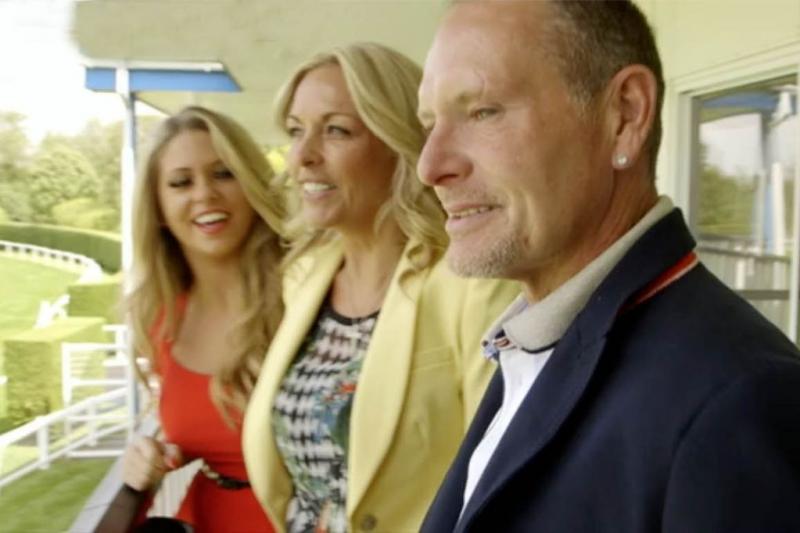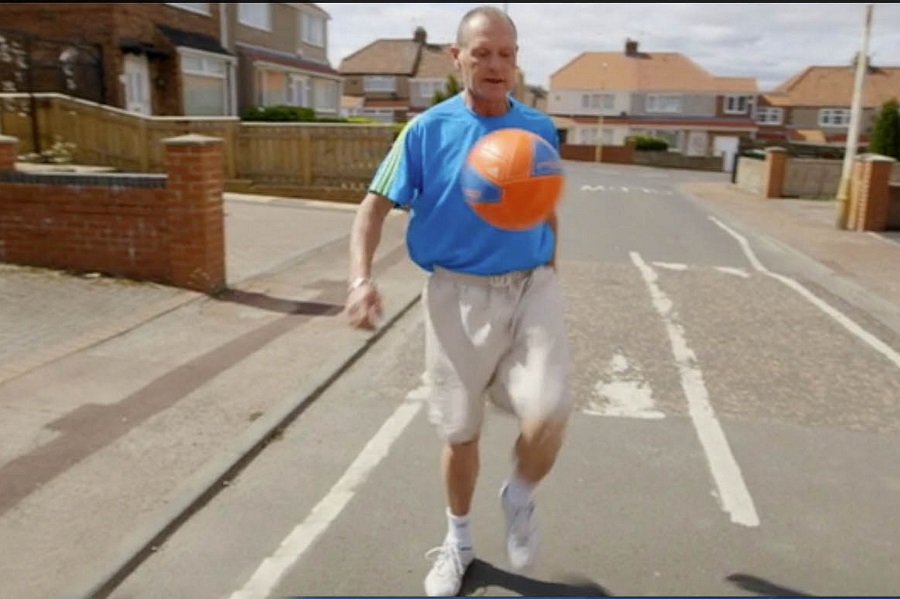Being Paul Gascoigne, ITV | reviews, news & interviews
Being Paul Gascoigne, ITV
Being Paul Gascoigne, ITV
Cross between a 'Hello!' shoot and a suicide note should not have been on television

There was a time when England’s greatest and most charismatic footballer of the last 40 years would inspire fine writers to flights of poetry. Karl Miller in the London Review of Books compared him to “a priapic monolith in the Mediterranean sun”. Not to be out-hyperbolised, Ian Hamilton in Granta invoked a Miltonic Old Testament hero in his essay “Gazza Agonistes”.
That was in 1990, before the wife-beating and other agonies. The literati have long since abandoned Paul Gascoigne to his horribly public decline, and his life is now measured out in redtop headlines. They come along as regularly as Swiss trains. This documentary seemed conceived as a way of rebooting the narrative. For three months, a very ill man, fresh out of his most recent stint in rehab, let a camera crew follow him around. He visited his long-suffering family in Newcastle, his ex-wife and children on his birthday, and spread the message of recovery to whoever would listen.
Precisely who was supposed to gain from this arrangement was not clear. ITV got an hour of deeply saddening car-crash television against which they could sell pots of advertising, and Gascoigne consented to continue his never-ending therapy in front of several million people. Perhaps the vague notion was that holding awkward conversations with his miraculously centred children on national television would somehow shame him into staying on the wagon.
 Gascoigne has no idea what caused his alcoholism, and the programme didn’t seem inclined to find out. He admitted to an addictive personality - his cupboards are stuffed full of sweets and jeans, while he obsessively cleans his apartment and tidies away the lines in his prematurely aged face with regular visits to the Botox clinic. He looks like his own waxwork copy. He wasn’t asked about coping with the constant love and adulation of people on the street, and the knowledge that the endorphin-releasing high supplied by football is, unlike booze, no longer available on tap. The most poignant vignette in the film found Gascoigne trying to engage a boy doing a paper round in conversation. This was in the street in Newcastle where he had generously bought houses for his entire family. The boy didn’t seem to recognise him, or want to talk.
Gascoigne has no idea what caused his alcoholism, and the programme didn’t seem inclined to find out. He admitted to an addictive personality - his cupboards are stuffed full of sweets and jeans, while he obsessively cleans his apartment and tidies away the lines in his prematurely aged face with regular visits to the Botox clinic. He looks like his own waxwork copy. He wasn’t asked about coping with the constant love and adulation of people on the street, and the knowledge that the endorphin-releasing high supplied by football is, unlike booze, no longer available on tap. The most poignant vignette in the film found Gascoigne trying to engage a boy doing a paper round in conversation. This was in the street in Newcastle where he had generously bought houses for his entire family. The boy didn’t seem to recognise him, or want to talk.
Off the sauce, Gascoigne revealed a cheering brightness and a cheeky sense of humour. But towards the end of the shooting schedule he began drinking again, triggering another set of headlines. The interviewer Jane Preston asked him if he wasn’t actually attempting to end it all by degrees. He had to concede that she was probably right. In which case this unseemly and desperate cross between a Hello! shoot and a suicide note should not have been on television, even as a stern deterrent to other alcoholics.
The future of Arts Journalism
You can stop theartsdesk.com closing!
We urgently need financing to survive. Our fundraising drive has thus far raised £49,000 but we need to reach £100,000 or we will be forced to close. Please contribute here: https://gofund.me/c3f6033d
And if you can forward this information to anyone who might assist, we’d be grateful.

Subscribe to theartsdesk.com
Thank you for continuing to read our work on theartsdesk.com. For unlimited access to every article in its entirety, including our archive of more than 15,000 pieces, we're asking for £5 per month or £40 per year. We feel it's a very good deal, and hope you do too.
To take a subscription now simply click here.
And if you're looking for that extra gift for a friend or family member, why not treat them to a theartsdesk.com gift subscription?
more TV
 Blu-ray: The Sweeney - Series One
Influential and entertaining 1970s police drama, handsomely restored
Blu-ray: The Sweeney - Series One
Influential and entertaining 1970s police drama, handsomely restored
 I Fought the Law, ITVX review - how an 800-year-old law was challenged and changed
Sheridan Smith's raw performance dominates ITV's new docudrama about injustice
I Fought the Law, ITVX review - how an 800-year-old law was challenged and changed
Sheridan Smith's raw performance dominates ITV's new docudrama about injustice
 The Paper, Sky Max review - a spinoff of the US Office worth waiting 20 years for
Perfectly judged recycling of the original's key elements, with a star turn at its heart
The Paper, Sky Max review - a spinoff of the US Office worth waiting 20 years for
Perfectly judged recycling of the original's key elements, with a star turn at its heart
 The Guest, BBC One review - be careful what you wish for
A terrific Eve Myles stars in addictive Welsh mystery
The Guest, BBC One review - be careful what you wish for
A terrific Eve Myles stars in addictive Welsh mystery
 theartsdesk Q&A: Suranne Jones on 'Hostage', power pants and politics
The star and producer talks about taking on the role of Prime Minister, wearing high heels and living in the public eye
theartsdesk Q&A: Suranne Jones on 'Hostage', power pants and politics
The star and producer talks about taking on the role of Prime Minister, wearing high heels and living in the public eye
 King & Conqueror, BBC One review - not many kicks in 1066
Turgid medieval drama leaves viewers in the dark
King & Conqueror, BBC One review - not many kicks in 1066
Turgid medieval drama leaves viewers in the dark
 Hostage, Netflix review - entente not-too-cordiale
Suranne Jones and Julie Delpy cross swords in confused political drama
Hostage, Netflix review - entente not-too-cordiale
Suranne Jones and Julie Delpy cross swords in confused political drama
 In Flight, Channel 4 review - drugs, thugs and Bulgarian gangsters
Katherine Kelly's flight attendant is battling a sea of troubles
In Flight, Channel 4 review - drugs, thugs and Bulgarian gangsters
Katherine Kelly's flight attendant is battling a sea of troubles
 Alien: Earth, Disney+ review - was this interstellar journey really necessary?
Noah Hawley's lavish sci-fi series brings Ridley Scott's monster back home
Alien: Earth, Disney+ review - was this interstellar journey really necessary?
Noah Hawley's lavish sci-fi series brings Ridley Scott's monster back home
 The Count of Monte Cristo, U&Drama review - silly telly for the silly season
Umpteenth incarnation of the Alexandre Dumas novel is no better than it should be
The Count of Monte Cristo, U&Drama review - silly telly for the silly season
Umpteenth incarnation of the Alexandre Dumas novel is no better than it should be
 The Narrow Road to the Deep North, BBC One review - love, death and hell on the Burma railway
Richard Flanagan's prize-winning novel becomes a gruelling TV series
The Narrow Road to the Deep North, BBC One review - love, death and hell on the Burma railway
Richard Flanagan's prize-winning novel becomes a gruelling TV series
 The Waterfront, Netflix review - fish, drugs and rock'n'roll
Kevin Williamson's Carolinas crime saga makes addictive viewing
The Waterfront, Netflix review - fish, drugs and rock'n'roll
Kevin Williamson's Carolinas crime saga makes addictive viewing

Add comment